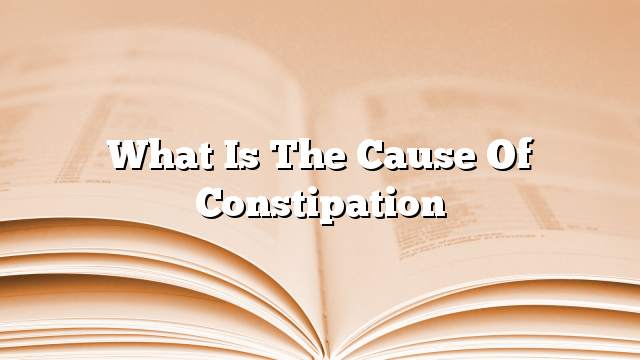Constipation is defined as the inability to defecate, ie, the removal of waste from the body easily, or interrupting in the removal of stool, or defecation every two or three days and sometimes up to a full week rather than on a normal daily basis. Other symptoms include acute pain in the anus, bleeding or mucus, headache, dizziness, abdominal distension, indigestion, general weakness of the face with paleness in the body, discomfort and other psychological effects such as nervousness or depression.
Constipation is a common problem, affecting nearly 30% of the world’s population. It is not considered a serious health problem but it is tired of the body and may cause complications if not treated like hemorrhoids, other problems in the colon and absorption of food. The cause of constipation is due to the slow bowel movement and the existence of what is hindered by proper defecation, which is caused by one of the following reasons:
Causes of constipation
- Take some side effects drugs that cause intestinal pixels such as diuretics, antidepressants, hypnotics, antispasmodics, antihistamines and others.
- Bad diet: Focusing on fatty, saturated, sugary and starchy foods while neglecting foods rich in natural fiber such as fruits, vegetables and whole grains, which improve the bowel activity and leaves and excretes easily from the body.
- Dryness of the body: The lack of drinking fluids, especially water during the day and this weakens the movement of the bowel and difficult to remove the waste from them.
- Lack of movement: Long sitting and not practicing any kind of sports or housework works on the intestinal dyslexia and difficulty in its natural movement.
- Some organic problems: impaired thyroid activity, diabetes, cystic fibrosis, wheat allergy, hypercalcemia and other blood.
- Following some unhealthy diets may adversely affect bowel movement.
- Stress, nervousness and excess nervousness may cause major problems in the digestive system such as nervous and digestive reasoning and waste disposal disorder.
- Other diseases such as muscular dystrophy, congenital anomalies, paralysis paralysis, colon cancer, pelvic floor dysfunction.
- Some psychological problems such as blocking the voluntary defecation caused by the phobia of public baths or fear of the pain associated with protrusion.
Methods of treatment
This problem can be addressed by increasing fluid intake, increasing mobility, increasing intake of fiber-containing foods, and taking laxatives sold in pharmacies and some enemas if necessary.
